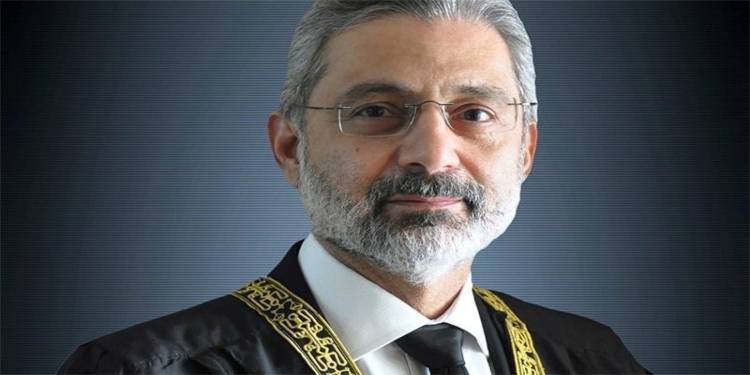
The Supreme Court of Pakistan (SC) has issued a circular regarding the verdict of Justice Qazi Faez Isa over the suo motu notice.
The Supreme Court Registrar stated in a circular that the observations on Article 184(3) in the rulings of Justice Faez Isa and Justice Ameen-Ud-Din were not made suo motu. It stated that the two judges' decision would not be enforceable under the law since it was in conflict with the five judges' decision.
The five-member bench's conclusion that the Chief Justice has the only right to issue suo motu notice is stated in the court circular, which claims that the decisions of two judges are in conflict with that decision.
According to the circular, the two judges' decision conflicts with the statute created by the larger bench, which the bench took suo motu notice of in the March 15 order. It states that the observations made in the two-member bench's ruling are not relevant, adding that the Chief Justice of Pakistan is the only person who may use the suo motu notice power and that the power may only be used in accordance with Article 184(3)'s procedure.
All cases related to Article 184(3) (suo motu) were ordered to be postponed by a special bench led by Judge Qazi Faez Isa. The court stated that all suo moto cases should be delayed until the rules are created.
The decision states that the Chief Justice of Pakistan lacks the authority to appoint a special bench.
On Thursday, Justice Ameen ud Din, who was part of the five-member bench of the Supreme Court, refused to hear the case of the postponement of elections in two provinces, after which the larger bench broke down.
Today, the newly-reconstructed four-member Supreme Court bench formulated to hear the Pakistan Tehreek-e-Insaf (PTI) plea challenging the ECP's decision of postponing elections in the Punjab and Khyber Pakhtunkhwa has dissolved once again after Justice Jamal Khan Mandokhail recused himself from hearing the petition.
The Supreme Court Registrar stated in a circular that the observations on Article 184(3) in the rulings of Justice Faez Isa and Justice Ameen-Ud-Din were not made suo motu. It stated that the two judges' decision would not be enforceable under the law since it was in conflict with the five judges' decision.
The five-member bench's conclusion that the Chief Justice has the only right to issue suo motu notice is stated in the court circular, which claims that the decisions of two judges are in conflict with that decision.
According to the circular, the two judges' decision conflicts with the statute created by the larger bench, which the bench took suo motu notice of in the March 15 order. It states that the observations made in the two-member bench's ruling are not relevant, adding that the Chief Justice of Pakistan is the only person who may use the suo motu notice power and that the power may only be used in accordance with Article 184(3)'s procedure.
All cases related to Article 184(3) (suo motu) were ordered to be postponed by a special bench led by Judge Qazi Faez Isa. The court stated that all suo moto cases should be delayed until the rules are created.
The decision states that the Chief Justice of Pakistan lacks the authority to appoint a special bench.
On Thursday, Justice Ameen ud Din, who was part of the five-member bench of the Supreme Court, refused to hear the case of the postponement of elections in two provinces, after which the larger bench broke down.
Today, the newly-reconstructed four-member Supreme Court bench formulated to hear the Pakistan Tehreek-e-Insaf (PTI) plea challenging the ECP's decision of postponing elections in the Punjab and Khyber Pakhtunkhwa has dissolved once again after Justice Jamal Khan Mandokhail recused himself from hearing the petition.

